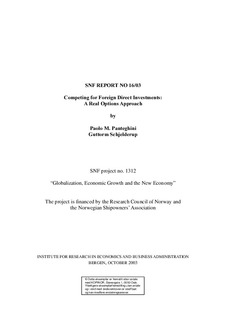| dc.contributor.author | Panteghini, Paolo M. | |
| dc.contributor.author | Schjelderup, Guttorm | |
| dc.date.accessioned | 2006-06-23T10:09:46Z | |
| dc.date.available | 2006-06-23T10:09:46Z | |
| dc.date.issued | 2003-10 | |
| dc.identifier.isbn | 82-491-0273-8 (trykt versjon) | |
| dc.identifier.issn | 0803-4036 | |
| dc.identifier.uri | http://hdl.handle.net/11250/164557 | |
| dc.description.abstract | This paper uses the Bad News Principle to study how the ability of multinationals to shift profits by transfer pricing affects both the timing of foreign direct investment decisions and government tax policy. A main finding of the paper is that if countries compete to attract foreign direct investments, only weak conditions are needed to establish that welfare is higher when firms can postpone irreversible investments as opposed to when they cannot. | en |
| dc.format.extent | 260590 bytes | |
| dc.format.mimetype | application/pdf | |
| dc.language.iso | eng | en |
| dc.publisher | SNF | en |
| dc.relation.ispartofseries | Report | en |
| dc.relation.ispartofseries | 2003:16 | en |
| dc.subject | corporate taxation | en |
| dc.subject | irreversibility | en |
| dc.subject | MNE | en |
| dc.subject | real options and uncertainty | en |
| dc.title | Competing for foreign direct investments : a real options approach | en |
| dc.type | Research report | en |
